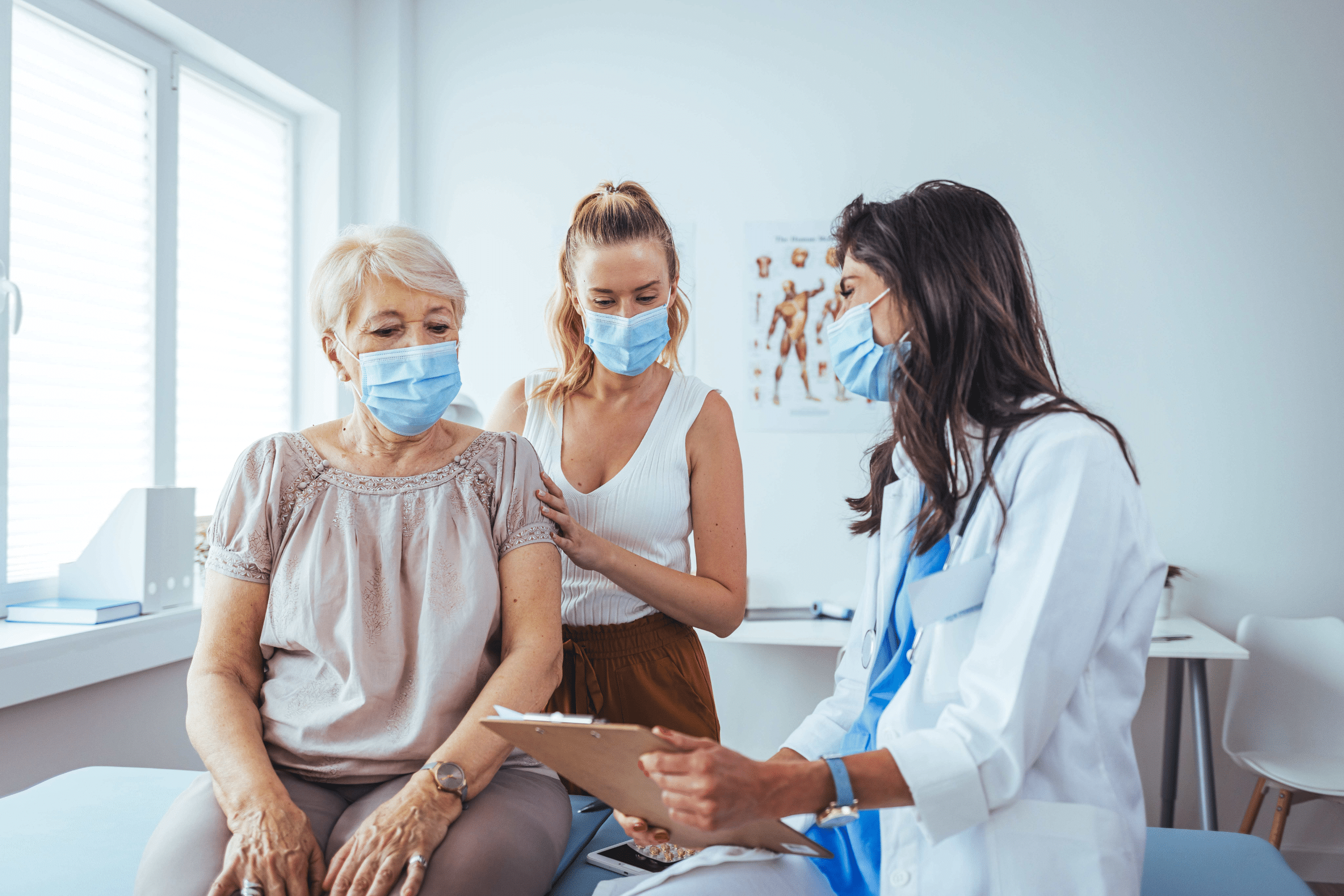If you’re a woman who has recently visited the doctor or has a doctor’s appointment coming up, you’re probably familiar with the concept of health screenings. Health screenings are tests that doctors perform to proactively check for diseases and illnesses before the patient shows any signs or symptoms. This can be beneficial for early treatment or disease prevention depending on the results of the screening.
The health screenings you should get vary by age and may only need to be repeated once every few years. Screenings can also vary based on risk factors and medical history, so you may need to get screened for certain conditions more frequently than other women your age.
Screenings can take place as part of a regular checkup or as part of a well-woman visit. Also known as a woman’s wellness exam, a well-woman visit includes a full checkup, screenings, patient education, vaccination, and more. The main goals for this visit are for your doctor to:
- Document your health habits and history, such as medical and family history, mental health history, and alcohol and tobacco use
- Give you a physical exam, including a pelvic exam for women
- Set goals to help you stay healthy, which may include scheduling follow-up health services
It is important to note that health screenings are guidelines and that the recommendations can vary based on the source or organization. If you’re not sure which screenings you should be getting, be sure to talk to your doctor. He or she can help you figure out which screening tests you should get and when based on your individual factors.
Here are the different health screenings your primary care provider can perform, and when you should get them:
Ages 18 to 39
Blood pressure screening
The U.S. Preventive Services Task Force (USPSTF) recommends screening for high blood pressure—known as hypertension—in adults 18 or older. Hypertension can increase the risk of stroke, heart attack, and other serious problems. Although it is more common in men, 44% of women in the United States have hypertension.
Between the ages of 18 and 39, you should get your blood pressure checked at least once every year if:
- Your blood pressure is in the normal range (less than 120/80)
- You have no risk factors for high blood pressure
Your blood pressure should be checked more often if:
- Your top (systolic) number is between 120 and 129, and your bottom (diastolic) number is between 70 and 79
- You have health conditions such as diabetes or heart disease or are overweight or obese
If your systolic number is between 130 and 139, and your diastolic number is between 80 and 89, talk to your doctor about ways to lower your blood pressure. This range is considered stage 1 hypertension, and your doctor will usually tell you to make lifestyle changes to get your blood pressure down. Your doctor may also prescribe blood pressure medication depending on your risk of cardiovascular disease.
Breast cancer screening
Breast cancer is the second most common cancer in women after skin cancer. It occurs when cells in the breast grow out of control and divide more rapidly than normal cells. Screening mammograms are not currently recommended for women under the age of 40. However, if you have an increased risk of breast cancer, such as a family history or high-risk genetic markers, you can talk to your doctor about getting screened early.
Cervical cancer screening
Cervical cancer is cancer that starts in the cells that line the cervix, the lower part of the uterus. Although it was once one of the most common causes of cancer death for American women, deaths from cervical cancer have declined due to increased use of the Pap test, which collects cells from the cervix to analyze for cancer and pre-cancer. The HPV test can also be used to screen for cervical cancer, or the two can be used together, called co-testing. Cervical cancer is most frequently diagnosed in women between the ages of 35 and 44, and rarely develops in women younger than 20.
Cervical cancer screenings should start at age 21. After your first test you should:
- Get a Pap test every three years between the ages of 21 and 29
- Get a Pap test every three years or an HPV test every five years, or get co-tested for both every five years if you are 30 or older.
Cholesterol screening
Cholesterol is a waxy, fat-like substance found in the blood. It’s needed in small amounts for good health, but if too much builds up in the blood vessels, it can increase the risk of heart disease and stroke.
Starting at age 20, you should get a cholesterol test every five years if you have normal cholesterol levels.
If you have risk factors for coronary heart disease, you should get screened more frequently. You should also get screened more frequently if you have lifestyle changes or if you develop conditions such as heart disease or diabetes.
Ages 40 to 64
Blood pressure screening
Between the ages of 40 and 64, you should have your blood pressure checked at least once a year. You may need it checked more frequently if you have certain health conditions.
Breast cancer screening
The general recommendation for mammograms or breast cancer screening is that women should begin getting them once every year or every two years starting at age 40. You may need to be screened more often if you have a family history or other risk factors for breast cancer. If you have a family history, your screenings will start earlier than the age at which the youngest family member was diagnosed.
Women 50 and older should get screened once every year or every two years depending on risk factors.
Cervical cancer screening
Between the ages of 40 and 64, continue getting screened for cervical cancer with a Pap test every three years, an HPV test every five years, or get co-tested every five years.
Colorectal screening
Colorectal cancer is cancer that starts in the colon or rectum. It may be called colon cancer or rectal cancer depending on where the cancer starts, but the two are often grouped together because they share similar features. Talk to your provider about getting screened if you are under the age of 45.
Between the ages of 45 and 65, you should:
- Get a colonoscopy every 10 years
- Get a CT colonography (virtual colonoscopy) every five years
- Get a stool-based fecal occult blood (gFOBT) or fecal immunochemical test (FIT) every year
- Get a stool test every one to three years
- Get a flexible sigmoidoscopy every five years or every 10 years with stool testing with FIT done every year
Ages 65 and up
Blood pressure screening
You should have your blood pressure checked at least once a year. You may need to get your blood pressure checked more often if you have certain health conditions, or if your reading is between 120/70 or 129/79.
Breast cancer screening
You should get a mammogram every one to two years up to the age of 75. You may also perform monthly self-exams, although experts do not agree about the benefits of self-exams.
Cervical cancer screening
If you have not already been diagnosed with cervical cancer or pre-cancer by the age of 65, you can stop getting screening tests if you:
- Have had three consecutive negative Pap tests and two negative PAP and HPV tests within the past 10 years
- Had your most recent test within the past five years
Cholesterol screening
If your cholesterol level is normal, get it rechecked every five years. You can get tested sooner if you make lifestyle changes or if you have certain health conditions.
Do you need a gynecologist if you have a primary care physician?
The American Congress of Obstetricians and Gynecologists (ACOG) recommends that female patients have their first gynecology visit between the ages of 13 and 15. As women get older, they are likely to have both a primary care physician (PCP) and gynecologist. Although it is possible for a gynecologist to serve as a PCP, and while PCPs can perform certain gynecological services such as Pap tests, the two have different areas of focus.
PCPs are also known as general practitioners because they have a wider range of services, such as checkups and immunizations. Gynecologists, on the other hand, specialize in the female reproductive system, from the first menstrual cycle through post-menopause.
The recommendations for health screenings can change as new literature becomes available, so it’s important to talk to your doctor about what tests you might need at different stages in your life.
Looking For a Primary Care Doctor in Connecticut?
PACT Primary Care is Accepting New Patients!
Locations throughout Connecticut in Guilford, Hamden, Madison, Milford, New Haven, Orange, West Haven and Wallingford.
To schedule an appointment, request an appointment online here or call a local center near you.










